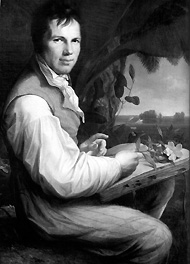![]()
Departments
![]()

|
Week of 8 October 1999 |
Vol. III, No. 9 |
Feature Article
Explorer's bicentennial
Commemorating von Humboldt's current relevance and his natural history legacy
|
|
|
A portrait of Alexander von
Humboldt in 1806, by Friederich Georg Weitsch.
|
By Hope Green
Alexander von Humboldt was an ecologist before the word existed.
In 1799 the explorer left his native Berlin to embark on a five-year wilderness trek through Central and South America, where he gathered plant and animal specimens, recorded meteorological data, and developed ideas that would influence generations of scientists, including Charles Darwin.
"The aims I strive for are an understanding of nature as a whole, proof of the working together of all the species of nature," Humboldt would write several years later.
Scholars will mark the bicentennial of Humboldt's critical journey with a symposium at SMG on Friday, October 8, and Saturday, October 9. The event, sponsored in part by BU's Center for Ecology and Conservation Biology (CECB), will bring together 14 presenters from across the scientific spectrum, as well as a historian who will describe Humboldt's lifelong friendship with Thomas Jefferson.
While Humboldt scholars around the world have studied his impact on individual disciplines, the conference is the first to focus on his natural history legacy.
"The symposium is unusual because it goes well beyond a simple historical review," says Joerg Lotze, director of the Humboldt Field Research Institute in Steuben, Maine, another cosponsor of the event. "While it was Humboldt's expedition which first brought him to the attention of academic circles, it is his later reflections and publications which make him such an enduring figure."
The explorer's relevance today "lies in his encouragement that we consider man and nature as a single entity and that we cannot consider natural history without considering man himself," Lotze adds. "It is Humboldt's nobility and depth of vision that can help us to transcend our modern compartmentalized view of nature and man."
As Lotze explains, Humboldt was something of a polymath, making major contributions to almost all the scientific disciplines of his day. He was the first naturalist to publish in the field of phytogeography, the study of the geographical distribution of plants. One of the conference speakers, an expert on vegetation science in Venezuela, will relate Humboldt's discoveries to modern botanical research.
A marine biologist and an anthropologist will also speak at the symposium on Humboldt's contributions to their fields, and there will be considerable discussion of contemporary challenges to the environment, including the rain forest regions where Humboldt meticulously recorded his observations.
The keynote speaker on Friday is author, photographer, and documentary filmmaker Loren McIntyre, who in 1971 discovered the most distant source of the Amazon in the Peruvian Andes. In a series of other expeditions beginning in 1978, he retraced Humboldt's path through the Americas and parts of Western Europe, taking thousands of photographs and interviewing numerous Humboldt scholars along the way.
His travels resulted in articles for several magazines, including National Geographic, and a 1982 book published in Germany, Die amerikanische Reise: Auf den Spuren Alexander v. Humboldts (The American Journey of Alexander von Humboldt). A revised edition was published this year.
In his lecture, McIntyre plans to provide an overview of the explorer's life and personal attributes before other presenters more closely examine his discoveries.
"He was loaded with information, and from the time he was very young he talked his head off," McIntyre says. "When he was in the States, he met the secretary of the treasury, who said he talked as fast as any three of his friends put together and in four languages at the same time. As he got older, he mellowed and became less vain and boastful. He was always scientifically minded, but he expanded into a much more benevolent person."
The conference will conclude with a lecture by Adrian Forsyth, senior biodiversity scientist at the W. Alton Jones Foundation and a research associate at the Smithsonian Institution's National Museum of Natural History.
"Perhaps more than anything," Lotze says, "the symposium points to one of Humboldt's key philosophies, that we not only need to consider man and nature as a single entity, but that we need to do so together as a global society."
Alexander von Humboldt's Natural History Legacy and Its Relevance for Today is cosponsored by the Center for Ecology and Conservation Biology, the German Consulate in Boston, and the Massachusetts Chapter of the Society for Conservation Biology. All presentations will be held at the School of Management, 595 Commonwealth Ave. Admission to the keynote address on October 8, which begins at 7:45 p.m., is free to the general public. The remainder of the symposium requires a fee of $60 ($35 for students) and includes lunch and a dinner banquet on October 9. For more information, contact Kellie White at CECB, (617) 353-6982.
